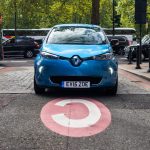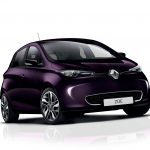The UK’s most cherished native wildflowers are facing extinction in large part due to vehicle emissions and air pollution, which is changing the face of the UK’s countryside, meadows, and road verges – home to 45 per cent of Britain’s total flora.
Renault – a pioneer in electric mobility pledging that 90 per cent of its sales mix will be electric vehicles in 2030 – has joined forces with conservation charity Plantlife. As the world faces an ongoing environmental crisis, with 40 per cent of our plants and fungi threatened with the risk of extinction, and 5.8 per cent risk created by pollution, the partnership aims to raise awareness of the positive effects that switching to EVs can have on the UK’s flora and greenspaces, as well as public health and the climate.

Since the 1930s, 97 per cent of the UK’s grasslands and meadows have disappeared, leaving threatened road verges as one of the last habitats for British flora and fauna. These undervalued environments are home to more than 700 species of wildflower – nearly 45 per cent of the UK’s total flora – including 29 of 52 species of wild British orchid.
To inspire the need to take action to protect British wildflowers and green spaces that are fast disappearing, a dramatic floral installation was unveiled in the Old English Garden at London’s Victoria Park, featuring Europe’s bestselling electric vehicle of 2020, the Renault Zoe.
Designed by celebrated florist and sustainability champion Larry Walshe – who was awarded a medal for his critically acclaimed display at The Chelsea Flower Show 2021 – the installation supports Renault’s mission to make electric travel accessible to everyone, as well as its commitment to the development of large-scale electric mobility.
The installation features a garden of blooms and foliage bursting outwardly from the Zoe. A detailed meadow-like effect of organically grown flora cascades throughout the vehicle, alongside both the boot and bonnet and onto the floor. The car was decorated with over 2,500 flowers and features native British wildflowers, including Gentiana, as well as species that are classified as endangered including Gladioli, Dahlias and the All 4 Love Rose, which is the world’s most endangered rose.
The installation challenges the UK’s 32 million drivers to accelerate switching to EVs before the Government’s 2030 ban on new petrol and diesel cars.
Tom Barker, Electrification Manager, Renault UK, added: “We all know that electric driving is better for the planet, but one of the least discussed benefits of electric driving is the abundantly positive impact it will have on our gardens and green spaces.
“The government has legislated to only producing electric cars and vans by 2030, but our pledge is more than that. We’re committed to making zero-emissions travel accessible to everyone, with electric driving not only benefitting the planet overall, but our green spaces we appreciate and care so much for.”
The thought-provoking exhibit complements Renault’s ongoing “Be Mindful, Don’t Idle” awareness campaign which aims to help improve air quality outside schools. This is because idling engines, which are common during school drop-off and pick-up times, contribute the equivalent of 150 party balloons-worth* of emissions unnecessarily into the atmosphere every minute per vehicle.
Sitting in traffic on the motorway or country roads with an idling engine causes the same volume of unnecessary emissions to infiltrate the surrounding flora and fauna, expediting the extinction of rare species and wildflowers.
Larry Walshe, award-winning florist, said: “I wanted to create an installation that celebrated the natural wonder of beloved and at-risk flora. Bold, beautiful and provocative, the piece confronts people to think about their impact on the environment and make positive changes to help protect and conserve our native flowers.”
The all-electric Zoe and Renault’s offering of the largest mix of electric vans, as well as E-Tech hybrid and plug-in hybrid options spanning the range from small cars to family SUVs, provide a solution for zero-emission mobility and the prevention of idling, which contributes to improved air quality, health, and biodiversity.
Earlier this year, Renault Group announced its strategic plan, ‘Renaulution,’ which saw the brand enter a new era focused on clean energy, sustainability, and smart technology. As industry leaders in the automotive energy transition, Renault aims to be the greenest brand in Europe by 2030, with nine out of 10 cars on sale being electric.
With up to 245 miles of range available from a single charge, and sustainable materials available inside the Zoe, it was the ideal electric mobility champion to demonstrate the connection between EV uptake and the positive impact on nature.
Ian Dunn, CEO, Plantlife, said: “One in five British wildflowers is under threat of extinction and there is a need for speed if we are to save some of the rare and threatened flora. A concerted push to electrify vehicles is a vital part of the essential journey to reduce emissions and we applaud Renault in their ambition to accelerate their EV plans ahead of the 2030 hard deadline set by the UK government.
“Cleaner cars delivered at pace offer fresh hope to wild plants that have been force-fed a junk diet of fossil fuel fumes for decades. Nowhere is this more keenly felt than on road verges, where air pollution from vehicles combined with poor management has seen floral diversity plummet by 20 per cent as vigorous species, such as nettles, that can tolerate polluted soils have outcompeted more delicate wildflowers, like harebell.
“Grassland habitats such as road verges are of critical importance in the fight against climate change as they underpin biodiverse ecosystems abounding with wildlife and lock down carbon.”
The flowers that were used in the installation were distributed to charitable causes across the capital.




















